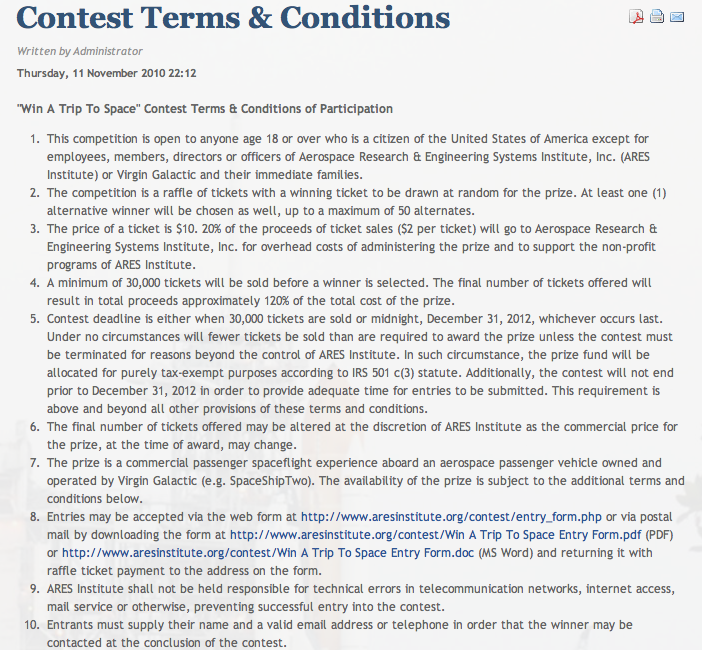Last week a Florida nonprofit, the Aerospace Research and Engineering Systems (ARES) Institute, announced a competition titled “Win A Trip To Space!”. The idea was simple: buy a raffle ticket, and one lucky winner will get a ticket on a suborbital spaceflight. But the contest rules appear to have quietly changed since last week’s announcement, perhaps to ensure that they comply with state law.
“In support of its mission to broaden public awareness of the benefits of space exploration, the Aerospace Research & Engineering Systems Institute, Inc. is giving the public the opportunity to take the ride of a lifetime to the edge of space! We have established an innovative contest giving any U.S. citizen age 18 or older the chance to purchase tickets at $10 a piece to be placed into a raffle,” read the opening paragraph of the ARES Institute press release, emailed late Friday by the organization’s executive director, Matthew Travis. Later, the press release notes: “The contest will end when either the required number of tickets have been sold to cover the prize costs or on December 31, 2012, whichever comes later. This ensures that sufficient funds are raised for the spaceflight and that everyone will have an adequate opportunity to purchase tickets.”
Both the explicit charge for the tickets and the requirement that a certain number be sold, though, appeared to run afoul of Florida law. Section 849.0935 of the Florida Statues does allow nonprofits like the ARES Institute to carry out “drawings by chance” like this one, but with several conditions. One of them is that it is unlawful to “require an entry fee, donation, substantial consideration, payment, proof of purchase, or contribution as a condition of entering the drawing or of being selected to win a prize.” (It does go on to state that organizations are allowed to suggest a minimum donation.) It’s also unlawful to “condition the drawing on a minimum number of tickets having been disbursed to contributors or on a minimum amount of contributions having been received”.
The current rules make no mention of an entrance fee or a number of tickets sold. “No purchase is necessary to enter the drawing, but donations are accepted and encouraged,” the rules now state. A $10 donation, for example, will get you an entry as well as a DVD and a six-month subscription to access portions of the Spaceflight News web site, valued at about $40. The rules now also explicitly state, “There is no maximum number of tickets that may be issued.” (There’s no mention of a minimum number, either.)
That’s a change from the old rules, a screenshot of the cached version of which is below. “The price of a ticket is $10,” the rules state, with 20% of the cost going to the ARES Institute for overhead costs associated with the competition and to support the organization’s other activities. The next rule states: “A minimum of 30,000 tickets will be sold before a winner is selected.” And the following rule: “Contest deadline is either when 30,000 tickets are sold or midnight, December 31, 2012, whichever occurs last. Under no circumstances will fewer tickets be sold than are required to award the prize unless the contest must be terminated for reasons beyond the control of ARES Institute.”

A screenshot of the original competition rules, as they appeared on the ARES Institute's web site on November 13.
ARES Institute made no announcement about the changes, or why they were made. Over the weekend I emailed Mr. Travis asking him a couple of questions about the competition, including that state law appeared to prohibit a mandatory charge on entries. I received no response from him, but by Wednesday morning at the latest the updated rules had been posted. (There’s no evidence, though, that my inquiry led to the rules change, only that I never heard back from the organization and only later found that they had since changed the rules.)
There’s one other change in the new rules worth noting. The current rules mention only that the winner will get “a commercial passenger spaceflight experience on a passenger aerospace vehicle supplied by commercial provider”, generically referred to in the rules as a “Spaceflight Provider”. The older version of the rules, though, specifically mentioned Virgin Galactic as the spaceflight provider (“a commercial passenger spaceflight experience aboard an aerospace passenger vehicle owned and operated by Virgin Galactic (e.g. SpaceShipTwo).”) Other elements of the original rules prohibited Virgin Galactic employees and their families from participating, and also noted that “Virgin Galactic is the sole operator of the spaceflight and has sole discretion over legal and contractual obligations between Virgin Galactic and the prize winning participant.” While those rules also noted that the ARES Institute is not affiliated with Virgin, it appears that either the organization is hedging its bets about availability of suborbital spaceflight operators or was asked not to explicitly identify Virgin in the rules.

For the past 10 years I have worked very hard to bring forth a LEGAL solution so the everyday person may have a legal solution to participate in space tourism. When the ARES Institute announced their raffle, I felt I should quickly advise Matthew Travis he was in direct violation of law. He replied back and said he was going to remove the raffle.
Seems to me he desires to learn the hard way. It would not be suprised to see not only an Attorney General (in another state) indict him for violation of internet gambling but for Homeland Security to also enforce The Patriot Act.
If the space tourism raffle was the solution I would have done it years ago!
[…] A spaceflight raffle – with a change in rules – NewSpace Journal […]